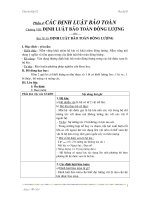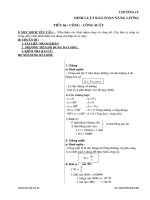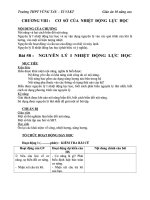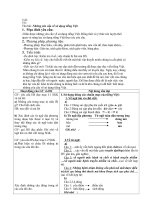Giáo án 10 ecotourism
Bạn đang xem bản rút gọn của tài liệu. Xem và tải ngay bản đầy đủ của tài liệu tại đây (350.66 KB, 5 trang )
<span class="text_page_counter">Trang 1</span><div class="page_container" data-page="1">
- Use the lexical items related to the topic ecotourism;
- Identify intonation patterns and use appropriate intonation (i.e. rising or falling tone);
<b>2. Core competence</b>
- Be collaborative and supportive in pair work and teamwork - Use conditional sentences Type 1 and Type 2 correctly. - Access and consolidate information from a variety of sources - Actively join in class activities
<b>3. Personal qualities</b>
- Develop a sense of an ecotourist
- Be aware of tourism and their impact on the environment
<b>II. Materials</b>
-Grade 10 textbook, Unit 10, Language
-Computer connected to the Internet -Projector/ TV/ pictures and cards -sachmem.vn
<b>Language analysis </b>
Type 1 <sup>If + present simple, S + will+ </sup> Vinf
Conditional sentences type I talk about real situations in the present or future that we believe are possible or likely to happen
<i>+ Ex: If you work hard, you will pats the exam.</i>
Type 2 If + past simple, S + would + Vinf
Conditional sentences type 2 talk about imaginary
situations that are impossible or unlikely to happen
<i>+ Ex: If I were a bird, I would fly</i>
<b>Assumptions </b>
- Students may be confused when using conditional sentences type 1 and type 2
- Students may have underdeveloped speaking and co-operating skills.
- Give short and clear explanations with legible for each case.
- Give clear instructions, give examples before letting students work in groups. - Provide feedback and help if necessary.
SV: Nguyễn Thị Quyên - 2167010099
</div><span class="text_page_counter">Trang 2</span><div class="page_container" data-page="2">1. Conditional sentences Type 1: If + present simple, S + will+ Vinf 2. Conditional sentences Type 2: If + past simple, S + would + Vinf
Task 1: Identify the mistake in each of these sentences Task 2: Choose the best answers to complete the sentences
Make conditional sentences type 1 and type 2 based on real situations
<b>III. PROCEDURES</b>
In each activity, each step will be represented as following: * Deliver the task
** Implement the task *** Discuss
**** Giving comments or feedback
<b>-</b> Teacher uses the storytelling method with 6 pictures to introduce students to conditional sentences type 1
<b>If the sun sets, Jason will rest </b>
in his cottage
<b>If the birds sing, he will join them </b> One day, he wished
to explore the world
</div><span class="text_page_counter">Trang 3</span><div class="page_container" data-page="3"><b>-</b> Teacher uses the rub out and remember method to delete some verbs in bold (sets – will rest, sing – will join; were – would flow) in the story
Teacher asks students to remember and repeat the story.
Teacher rubs out the story content in pictures 2, 3, 5 containing conditional sentence grammar Teacher elicits the target language from students: + If the sun goes down what will Jason do? + If the birds sing what will Jason do? + If he were a river what would he do?
<b>-</b> Teacher takes three examples from the story that contain grammar, prompts students to analyze the grammar of conditional sentences type 1 and type 2 Asks students to answer and checks
<b>-</b> Teacher asks students to study the examples again Students decide which statement is possible or
likely to happen, and which one is imaginary or unlikely to happen.
Teacher asks students to peer check and give comments to their partners.
Teacher checks answers as a class:
<b> Answer: Ex 1: R</b>
Ex 2: R Ex 3: N
➤ Tell students that all sentences that are possible or likely to happen are conditional sentences Type 1, while sentences that are 'imaginary or unlikely to happen are conditional sentences Type 2
</div><span class="text_page_counter">Trang 4</span><div class="page_container" data-page="4">travel around the world more time to sleep
<b>-</b> Teacher asks students Identify the mistake in each of these sentences and tells them to pay attention to the meaning of each sentence, and whether the situation is possible (Conditional sentence Type 1) or not (Conditional sentence Type 2)
<b>-</b> Students complete the task individually.
<b>-</b> Teacher asks students to peer check and give comments to their partners.
<b>-</b> Teacher checks answers as a class: Check answers as a class:
Have individual students write the sentences on the board.
Go through each sentence and ask Ss to explain why they have used that particular form.
<b>Answer: </b>
1. B) will would (conditional sentences type 2) 2. A) are were (conditional sentences type 2) 3. A) are trying try (conditional sentences type 1: If + S + V(present simple), S+will + Vinf)
4. C) will would (conditional sentences type 2)
1. If tourists buy local products, more of their money (stay) ______ in the community
A. stayed B. will stay C would stay D is staying 2. If we lived in the countryside, we (grow) ________ our own vegetables
A. grow B will grow C. would grow D. grew 3. If my grandmother (be) ____ still alive, she (be) ____ a hundred today
A. are – would be B. were – would be C. were – will be D. are – will be 4. If we __________ (stay) up late, we __________ (be) exhausted tomorrow morning
A. stay – will be B. stayed – would be C. are staying – will be D. stayed – will be 5. If I (have)___ superpower, I (save)___ the world! A. have – will save B. had – saved C. will have – save D. had - would save 6. If it (rain)___ tomorrow, we (stay)___ at home. A. rains – stay B. rains – will stay C. rains – would stay D. rained – would stay
6 mins
</div><span class="text_page_counter">Trang 5</span><div class="page_container" data-page="5">The teacher adapted the multiple-choice exercise to choose the correct answer into the game “ Đường lên đỉnh Olympia”
Game rules: teacher shows each question, each question has 1 minute to think, students work in pairs to discuss and raise their hands to answer.
<i><b>-</b></i> Teacher asks students choose the best answers to complete the sentencesand tells them to pay attention to the meaning of each sentence, and whether the situation is possible (Conditional sentence Type 1) or not (Conditional sentence Type 2)
<b>-</b> Students work in group complete the task.
<b>-</b> The group answers by raising paper contain their answer
<b>-</b> Teacher checks answers as a class: Check answers as a class: Have individual students answer
Go through each sentence and ask Ss to explain why they have used that particular form.
Answer: 1. B (conditional sentences type 1) 2. C (conditional sentences type 2) 3. B (conditional sentences type 2) 4. A (conditional sentences type 1) 5. D (conditional sentences type 2) 6. B (conditional sentences type 1)
<b>Group A: Imagine you visit a tropical forest on a</b>
rainy day. Use conditional sentences type 1 to express conditions and possible outcomes in this situation
<b>Group B: If you have the opportunity to </b>
participate in a major caving tour, but currently you cannot go for some reason. Use conditional sentences type 2 to express your wishes and the conditions necessary to achieve them.
<b>-</b> Teacher gives Ss clear instructions in order to make sure they can understand what they have to do. + Ss prepares their talk in two minutes
+ Ss present their answers
* Teacher asks Ss: What have you learnt today? - Use the lexical items related to the topic ecotourism; - Use conditional sentences Type 1 and Type 2 correctly. Homework:
- Prepare for the next lesson: Unit 10_Reading - Exercises in the workbook
T-S 1 mins
</div>








